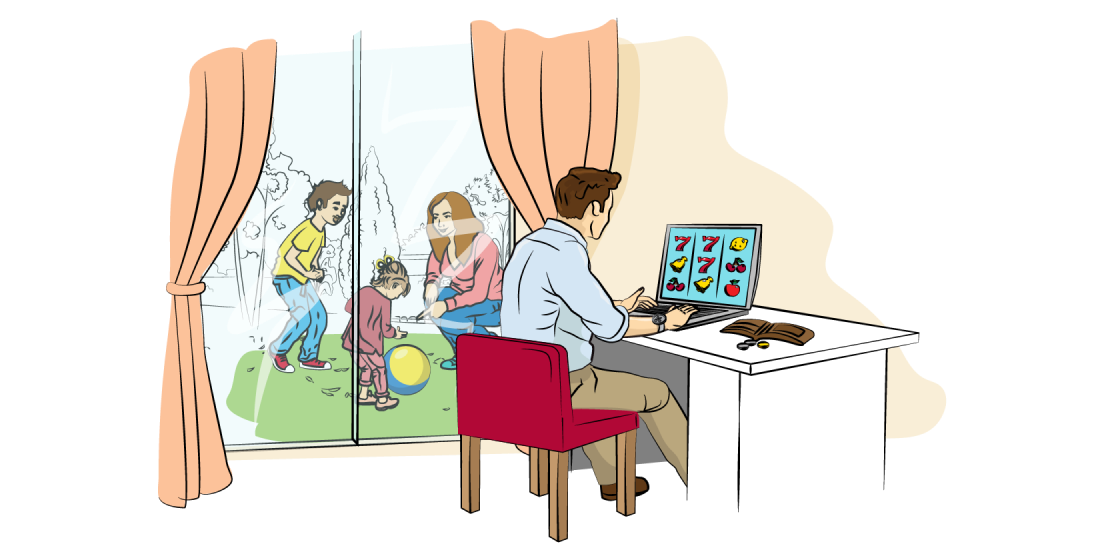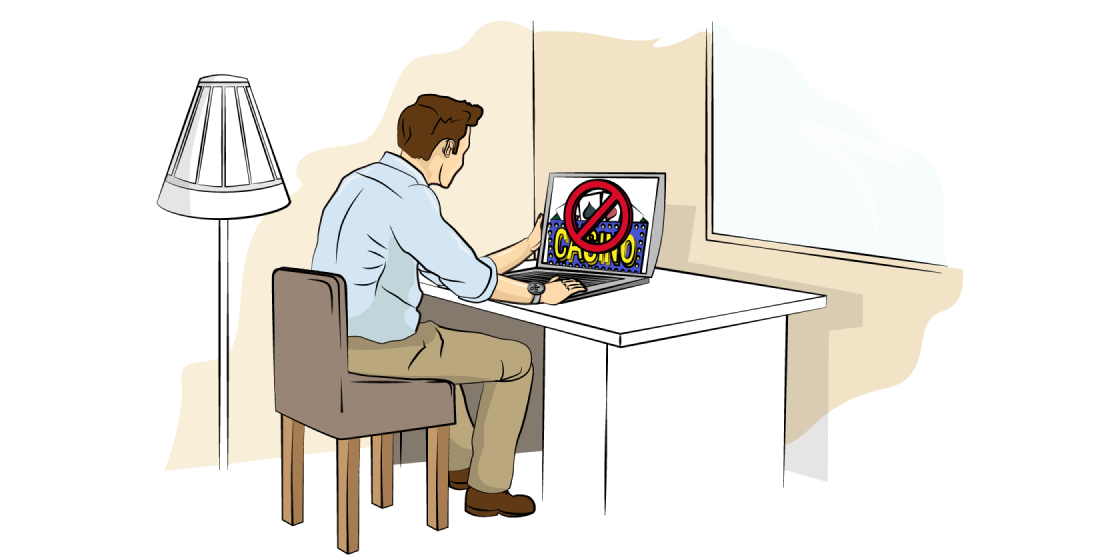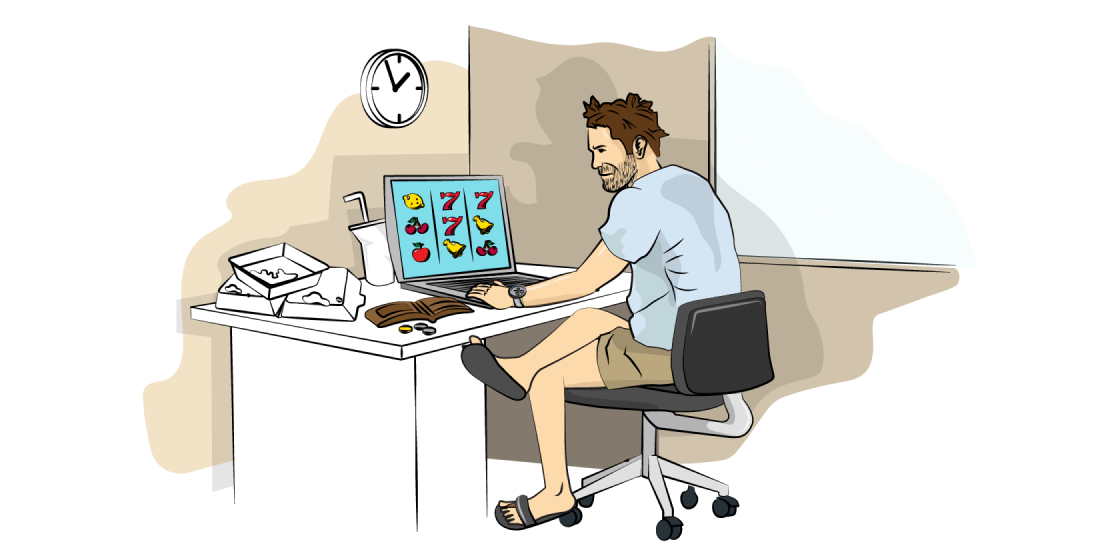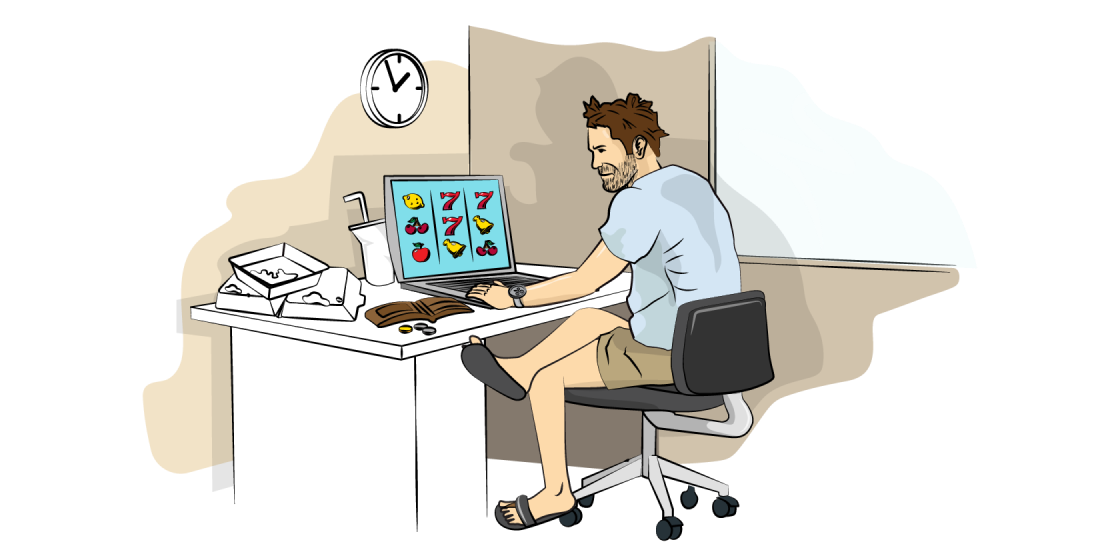How to Help a Problem Gambler: A Guide for Family & Friends
If you are worried about a loved one's gambling habits, we sincerely hope you will find what you are looking for in this article. We are going to talk about ways to identify signs of gambling addiction, how to talk to and help a problem gambler, and the things you can do to protect yourself and your family.
Contents of this article:
- Signs your loved one is a problem gambler
- Why and how someone becomes a problem gambler
- How to confront problem gamblers about their behavior
- How to help a problem gambler
- How to protect yourself and your family
Signs your loved one is a problem gambler
Has your partner, family member, or friend been acting suspiciously lately, and you're worried they might be addicted to gambling? Hopefully, it is just your imagination, but it might not be. But before you accuse them of anything, you should first assess your concerns and what has caused them.
In this part of the article, we have prepared for you three lists of signs that your loved one may be a problem gambler. Confirm or dispel your suspicions by going over them and checking off any signs that apply.
Money-related signs
- unexplained debt or borrowing money
- money or assets disappearing
- numerous loans, unpaid loans or disconnection notices
- little to no food in the house
- often "losing" money and/or wallets
- missing financial statements
- having secret bank accounts, loans or credit cards
- big changes in spending habits
Social signs
- moodiness and/or unexplained outbursts of anger
- depression
- avoiding contact with friends and family
- cutting back or quitting old hobbies
- family and friends complaining about the person being withdrawn and emotionally distant
- avoiding social events and gatherings
- trying to control and manipulate people through threats, lies or charm
- being secretive about activities
Time-related signs
- disappearing for periods that the person can't reasonably account for
- no time for everyday activities
- over-using sick days and days off work
- spending a lot of time reading or watching gambling content
- taking an unusual amount of time to complete basic tasks (e.g. going out to get groceries from a shop around the corner and being gone for two hours)
Why and how someone becomes a problem gambler
In the above lists of problem-gambling warning signs, you may have found several worrying resemblances to someone close to you. In cases like this, feelings of confusion and disbelief are quite common. "How could someone dear to me become addicted to gambling? Why would they ever get involved?" Those are just some of the thoughts that might be going through your head right now.
The truth is that no one plans on becoming a problem gambler. Addiction is almost impossible to spot in its early stages and by the time it becomes evident, the person in question is usually addicted already. We have a much more in-depth article dedicated to the causes of problem gambling, which you can read here. But so you at least have a basic understanding of why people can become consumed by their gambling habits, here are the four underlying sources of gambling addiction.
- Beginner's luck – They have the (mis)fortune of winning big when they first start playing. A person like this is likely to return to gambling repeatedly in the hope of enjoying the thrill of winning again. If they suffer big losses, however, it is likely to upset their healthy gambling habits and they may start to become addicted.
- Escapism – If people struggle with difficult life situations or negative emotions, gambling can seem like a way to leave such issues behind. The trouble is that over-indulging in gambling is very easy. These people may start seeing the answer to all of their problems in gambling, which never works out in their favor.
- Social isolation – People who feel alone or isolated from other people may start gambling just to feel part of a community. Gambling urges which stem from a place of unhappiness are generally the most likely to result in a person developing unhealthy gambling habits.
- Parental influence – Have you ever seen a packet of cigarettes with 'Children of smokers are more likely to become smokers themselves' written on it? It is no different with gambling. If children have a negative family background where one or both parents gamble often, they have a high risk of following in their parents' footsteps.
Before you confront someone about problematic gambling behavior, there are some things you should consider. One of them is what issues or situations could be making them act in such a way. Try to be empathetic and see where they are coming from before you pass any judgment on them.
How to confront problem gamblers about their behavior
So, you have serious reasons to believe that someone close to you has a gambling problem. You think you understand where their issue stems from and are ready to confront them about their behavior. But there is one more thing to do before you sit them down to talk.
Prepare for the talk
Make sure you are in a good emotional and mental state. Discovering that someone close to you is a problem gambler can set off any number of emotions in you - loss of trust, fear, anger, frustration, confusion, helplessness, etc.
But to be able to help someone, you first need to be strong yourself. It will take a lot of time to make loved ones change their ways, so take steps to protect yourself and the well-being of your family and friends. Maintain a healthy routine - exercise, meet with friends and socialize, and take time to indulge in your hobbies.
Remember that the problem gambler is not doing this to spite you or hurt you. No one chooses to become a problem gambler but is instead a victim of circumstance. Problem gambling often starts as a misguided attempt at bailing themselves or their families out of a financially-troubled situation.
Sit them down and have the conversation
Once you are as prepared as possible, it is time to think about when and where you are going to have your intervention. Pick a time when your loved one can have a serious conversation and is in a good mood. As for the place, you should aim for somewhere private, where both of you can feel calm and safe.
Do not forget that, despite these precautions, problem gamblers may react in several ways. They may get angry, feel relieved that they have someone to talk to, be ashamed of their behavior, or even try to lie their way out of the situation. Keep these possible reactions in mind and have a plan for how to deal with them.
When it comes to having the conversation, there are some things we recommend you do and not do.
- Do explain the impact that their gambling is having on those around them
- Do focus on the positives and what can be done to improve their situation
- Do talk to them about the benefits of cutting back or even quitting gambling completely
- Do tell them that you are doing this because you care about them
- Do use the words that they use to talk about gambling so that they can understand your points better
- Do let yourself be open to what they have to say.
- Do ask them, "How bad do things have to get before you see this as a problem?"
- Do have patience with them
- Do not blame them or label them a problem
- Do not lecture them - they will stop listening if you talk down to them
- Do not tell them what you would do in their place unless you have overcome an addiction yourself
- Do not tell them what to do, come to a conclusion together instead
It is likely that you might get side-tracked during the intervention, but there are four distinct points that your conversation should cover.
1. Explain how you feel
Tell your loved ones what changes you have noticed in their behavior, why it concerns you, and how it makes you feel.
2. Listen to what they have to say
Give them plenty of time to share their side of the story. Do not interrupt them until they are finished. Then you can ask them to think about their gambling, whether or not they consider it to be a problem.
If they do not see it as a difficulty, you can suggest that they take a test that can tip them off to their problem gambling. We have an entire article on problem gambling diagnosis. It features lots of helpful information, the Gamblers Anonymous questionnaire, as well as many other forms of problem-gambling diagnosis.
3. Ask them for their opinion
Ask them what they would do in your situation and what they feel the next course of action should be. If the discussion gets too heated at any point and begins turning into an argument, end it. Agree to come back to it at a later date, to give both of you enough time to calm down.
4. Encourage them to start considering ways to deal with the problem
Discuss potential approaches that they could take. You can also recommend some helpful resources so that they can do their own research before making a decision. You might find our article How to Overcome Problem Gambling helpful at this point.
How to help a problem gambler
There is no single correct route to take when it comes to rehabilitating a problem gambler. You always have several possible paths open to you, which we are going to discuss in this part of the article. Different approaches can work better or worse for different people and there is no guaranteed way to determine immediately which approach is right for your loved one.
To start with, let the problem gambler choose which one they would like to try. Monitor their progress and, if their situation does not improve, try a different approach. It takes time to re-cover from an addiction, so be patient and supportive.
1. Work together
Working together with problem gamblers is an excellent way of progressing towards their eventual rehabilitation. However, do not confuse 'working together' with 'working for them'. You should set clear limits on how much and with what you are willing to help them. Do not sacrifice your health, mental well-being, and financial stability for their sake.
We have prepared several suggestions for the things you can do to help. Pick those you feel are right for you and apply them.
Managing finances
- set a daily, weekly or monthly maximum spend on gambling - ideally zero
- help them set up a general budget and direct debits for bills
- consider ways to limit their access to money for non-essential expenses
- look after their credit and debit cards for a set amount of time
- if they ask you for a loan, consider paying their bills and debts yourself and make sure they pay you back in full and on time
Socializing and free-time activities
Cutting back on gambling can free up a lot of time for the gambler but boredom is dangerous in these circumstances because, with nothing else to entertain them, their gambling compulsions can get the better of them.
- spend time with them and fill the time with fun activities
- reconnect them with family and friends to build a healthy support structure
Set up new household rules
These are more easily enforced if you live with the problem gambler in question. Make sure that you not only set the rules but also agree on consequences if they are not followed.
- make them disclose all current debts and check relevant financial statements regularly, to see that there are no new debts
- no more bailing them out of their gambling debts
- separate their access to finances from yours, limit their access to cash or credit
- manage all of their finances for a set time
- if you feel it is right and necessary, consider leveraging your mutual relationship as being conditional on them quitting their bad habits
2. Get professional help
Sometimes gambling can get such a powerful grip on someone's life that neither they, you, nor the rest of their social circle can help. That's when you need to reach out to the professionals. On our site we have compiled a List of Problem Gambling Help Centers, featuring both international and country-specific options.
If you feel that you have run out of ways to help your loved one, we highly recommend that you look into problem gambling support groups or available professional help. Many support groups and peer-help solutions are completely free. And while psychologists and help centers can sometimes be costly, there is no price too great to pay for the health and safety of your loved ones.
3. Let the problem gambler work through it on their own
It is always possible that your loved one will not want any help from you. While it is true that many people cannot recover on their own, you should still respect their decision. Personal experience speaks louder than words, after all.
In case they choose this option, we recommend you check up on their progress often and have regular talks about their experience so far. Set a date or period (e.g. monthly) when you will sit down and re-evaluate the situation. If you see no improvements in their behavior, consider switching to a different approach.
How to protect yourself and your family
Helping a loved one who is a problem gambler should not come at the expense of your or your family's physical, mental, and financial health.
Protecting your mental and physical health
Dealing with problem gambling is a very draining experience, both mentally and physically, even when you are not its primary victim. To protect your own well-being, and that of your families, there are certain steps you should take.
To help mitigate problem gambling's stressful effects, make sure to keep to a routine. A healthy diet, sleeping schedule, and regular exercise will not only help you get your mind off of things, but they also release dopamine, which helps you to achieve a balanced state of mind and body.
Entertain yourself with hobbies and activities you enjoy. Do not allow your troubles to dominate every hour and minute of your day-to-day life, as that will not help anyone.
Socialize and confide in your family and friends. Sometimes it is necessary to get things off of your chest. Talk to the people you trust and express your emotions and worries. Speak plainly and don't hide anything, or it will continue eating away at you.
Consider working with a mental health professional yourself and discussing your situation with them. It can be difficult to process everything and deal with it alone, and therapists and other professionals will be able to help best.
How to decide whom you tell
You may be concerned about speaking out about your loved one's problems. It might feel like 'going behind their back'. Of course, the problem gambler should have the freedom to choose who knows about their predicament and you should discuss this topic with them before talking with anyone else.
However, if your loved one is in denial of their issue, you may have no other option than to discuss the situation without their consent. Before you do so, carefully consider the benefits and potential risks. Make your decision based on that.
If you feel physically threatened
Sometimes a problem gambler can be prone to violent outbursts, be they verbal or physical. Even though it might be difficult, and feel like a form of betrayal, you should distance yourself from such a person as quickly as possible. If you feel in danger, do not hesitate to call emergency services. You might also want to consider finding legal counsel, as you never know how a situation might escalate.
Protecting your finances
Gambling addiction is like a black hole, sucking away all available money, and leaving a void in people's wallets, bank accounts, and savings. This effect does not stop at problem gamblers, either, but can extend to their family, friends, and associates. So, if you do not want to leave your livelihood at risk, you should consider taking some preventative measures.
For starters, you should try to avoid lending the problem gambler any money or covering their debts. If you have done so in the past, beating yourself up over it will not help anyone, but do not repeat the mistake. It is also a good idea not to lend gamblers your credit cards, tell them your PINs or leave any of these things just lying around your house.
Reconsider your financial arrangements with the problem gambler. If they are your spouse or family member, you might be sharing credit cards or have a joint bank account. It is best to think about these arrangements carefully and consider changing them, at least for the time being. If you feel up to it, you could try to manage all of their finances yourself. But if that is not something you can or want to do, think about removing your name from any joint accounts you may have and getting separate credit cards.
Avoid debt and a bad credit score. Budgeting is never a pleasant experience but it is sometimes necessary. Explain to your family that you might have to tighten your belts for a little while. Check your spending history and cut back on unnecessary expenses. Draft a weekly or monthly budget plan and give your family members allowances for that period. Don't forget to prioritize the necessities and pay your dues on time. You can set up direct debits for your bills, mortgages, and other regular outgoings.
Do not get into any legal trouble. No matter how unlikely this may seem, you can never be too prepared. Situations in which addiction plays a major role can often spiral out of control, quickly and unexpectedly.
So keep a record of all your finances just in case, including assets, expenses, income, contributions, gifts, etc. It is also a good idea to photocopy and safely store copies of all your important documents like house titles or marriage and birth certificates. Avoid signing any documents you may not understand or contracts you know you cannot afford.
If you feel all this is too much for you to think about, you can always reach out to a financial counselor, who can help you set everything up and protect your family's finances.
Such counselors can help you with talking to your bank and preventing your house from being remortgaged. If you have a lot of debt, they can show you which debts should be seen as a priority, and help you negotiate with credit and banking agencies about your repayment. Should you need it, they can also walk you through the pros and cons of bankruptcy, as well as the procedures involved.
Negative consequences of problem gambling on children
Parents' gambling problems can have an immense impact on their children. Kids of problem gamblers have higher chances of following in their parents' footsteps and becoming problem gamblers themselves. They are also very likely to suffer from feelings of isolation, anger, and depression.
In extreme cases, the children might become victims of real existential problems. In a financially-unstable household, they might not have enough food to eat and may suffer from malnourishment, or their parents might not be able to afford to buy them clothes and shoes. Their studies and free-time activities are also likely to suffer due to the situation they have at home.
Children of problem gamblers are often forced to grow up earlier than most other children. They take over their parents' adult responsibilities, like looking after their younger siblings, for example. They might be forced to witness family feuds, violence, and eventual family break-down, potentially resulting in homelessness.
How to help children from problem gambling families
Children who find themselves in these situations, much like adults, need to express their emotions and talk about their situation. Sit down with them and allow them to talk freely about their feelings.
They might feel that they are somehow responsible for what is happening to their families. Nip these thoughts in the bud and assure them that they are not to blame. When talking to them, do not condemn their family member for being a problem gambler. This can be very confusing for a child, so separate the person from the behavior and just criticize the behavior instead.
Keep children occupied to help them take their mind off of their problems. It is also very desirable to involve the kids in family activities to prevent the breakdown of familial bonds. If possible, it is best not to over-involve them in solving the issues that their family is going through. After all, kids have a right to be kids.
In closing, helping a loved one who has become a problem gambler is a difficult task but it can be done. We sincerely hope that you have found something helpful in this article and that your family and friends will get back into a healthy way of life.

















